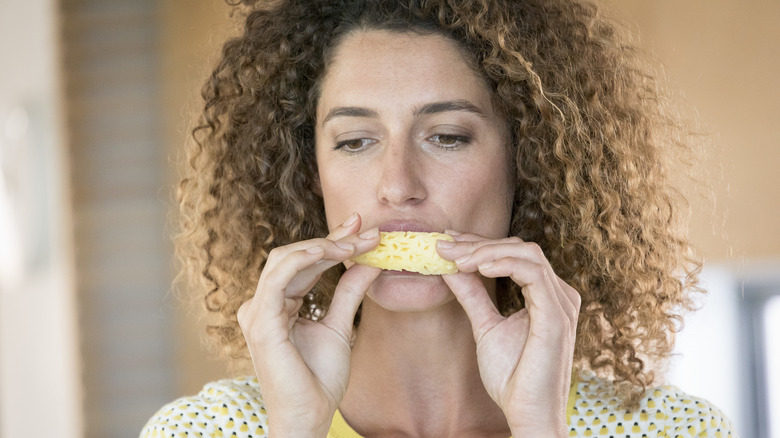
Hirurg/Getty Images
Slightly tart, slightly sweet, and completely refreshing, pineapple is one of the world’s most popular tropical fruits. While it’s a common addition to colorful fruit salads and makes occasional (if somewhat controversial) appearances on pizza, it also offers many health benefits. Pineapple is rich in vitamin C, which can boost immunity, and packed with fiber, which supports digestion. But did you know that it may also lull you to sleep? (It’s just one of the things that may happen when you eat pineapple every day.)
That’s because pineapples can stimulate the production of melatonin, the naturally occurring hormone that people often take before bed if they have trouble falling asleep. If you’d prefer not to take a supplement because you aren’t sure if taking melatonin every day is actually safe for you or want to see if you can adjust your diet to support more quality rest, adding pineapple can be a great choice. A 2013 study published in the Journal of Agricultural and Food Chemistry found that melatonin levels in the body increased by a stunning 266% after eating pineapple.
Sleep coach Cali Bahrenfuss, CCSH, RPSGT, explains that it’s important to time your consumption right to reap the most benefit overnight. “If falling asleep at bedtime is an issue, eating pineapple one to two hours before bed may help one fall asleep as the highest concentration of melatonin happens around two hours after consumption,” she told Sleepopolis.
The science behind the pineapple-sleep connection

Rawpixel.com/Shutterstock
Pineapple is rich in an amino acid called tryptophan, which the body uses to produce serotonin. The body alone doesn’t make tryptophan – consuming foods that contain it can keep your levels up. Your body can then use it to produce serotonin, the feel-good neurotransmitter that plays a vital role in virtually every aspect of your sleep by helping you relax and rest more soundly.
The brain also relies on serotonin to produce melatonin, which delivers a signal to your brain that it’s time to go to sleep. Pineapple also contains vitamin B6, which helps convert the tryptophan into serotonin more efficiently.
Luckily, it’s easy to incorporate pineapple at night. Chop it up and enjoy it sprinkled with cinnamon for a balanced PM snack that also tastes great (plus, this is what happens when you eat cinnamon every day). If you prefer a nighttime beverage, combining pure pineapple juice with some sparkling water can be a fun choice during summertime. It’s helpful to keep some chopped pineapple handy in the fridge so you can simply grab a few bites before you head to bed.
How pineapple became a viral sleep sensation

Eric Audras/Getty Images
In a day and age when something doesn’t seem like it’s truly popular until it goes viral, it’s safe to say that pineapple has earned the internet’s widespread approval. The fruit earned its megawatt social media status not for its glowing nutritional profile or its delicious flavor, but for its ability to promote a better night’s sleep. In fact, the #PineappleHacks hashtag accumulated millions of views on TikTok.
Dr. Amy Lee, who heads nutrition at Nuicific, tells Delish, “[c]onsumption of pineapple does indeed result [in] a higher level of melatonin metabolites compared to other fruits.” TikTok user Emma Robles shared a video of herself munching on the fruit, stating, “Eating pineapple before bed helps me fall asleep faster and sleep so much better.”
While pineapple may not replace your entire wind-down bedtime routine, it can be a smart addition if you’re looking for a natural and effective sleep aid. The tropical fruit is refreshing with a little bite, but can also be a sweet and healthy alternative to a traditional dessert. At the same time, it supports your body’s sleep-wake cycles to help you rest more comfortably.
Credit: healthdigest.com










